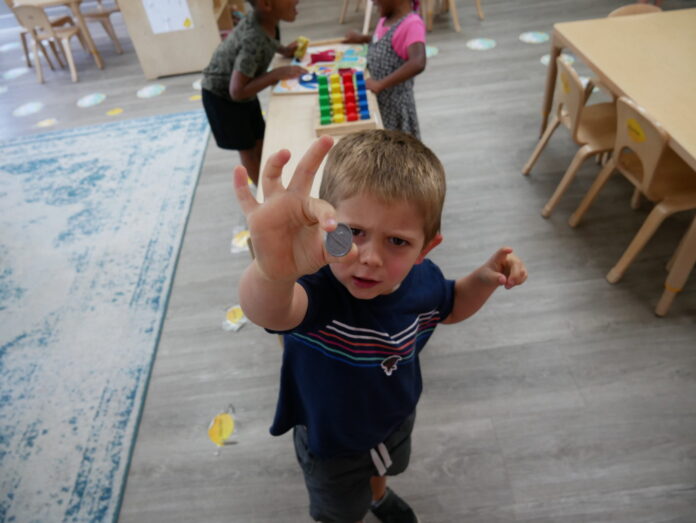Editor’s Note: The following piece is syndicated by Beacon Media.
I’m a heck of a proud mom.
My son is graduating next month and will head to college in the fall. We’ve spent the last year researching engineering programs and visiting campuses. He’s been accepted into all of his top schools, and I’m over the moon.
I’ve known for a long time that college would be a big expense, but I’ve wanted — badly — to make it happen for him. I’m a single mom and never made a lot of money, so I’ve planned the best I can for this moment, putting away savings here and there.
Now, as we apply for scholarships and financial aid and figure out how to tackle this enormous expense, I can’t help but think back to the early days when he was little. The huge, insurmountable financial hurdle was always child care.
A few weeks after my son was born, I returned to work — starting a long decade of negotiating, finagling, and being grateful for child care. I trudged through it like it was my burden alone to bear.
Before he was in kindergarten, I paid over half my take-home salary to pay for child care. Half. My. Salary. I know I’m not alone.
Once he started school, the cost reduced, but I still needed to pay for after-school care because I didn’t get off until five.
Those days are long gone. Now he drives, has a job, and is increasingly independent. But if I do the math on what I spent on child care and summer programs for that first decade of his life, it comes out to be almost exactly what his first choice college would cost for all four years. This is the same college I do not have the money to pay for today.
Here in North Carolina, Gov. Josh Stein recently formed a task force to study the problem. According to a report from the NC Department of Commerce, the average annual cost of center-based care for one infant is nearly $13,000 — or, as Stein pointed out, more than tuition at our state’s flagship public university, UNC-Chapel Hill. And that’s if you’re lucky enough to find a spot for your child.
We’ve long known that there is a child care crisis in the United States, with rising costs to parents and low pay for child care workers. Forty percent of those who work in child care make so little they qualify for some form of public assistance, like food subsidies, according to EdNC. There is one slot available for every five families that need one, resulting in those eye-popping price tags and long waitlists.
Despite all this, we continue to treat child care as a personal problem that deserves only private suffering. I spent years thinking that it was my own fault that I had a child too young, that I didn’t have a lucrative enough career, that I chose to be a single parent.
But the truth is, child care is a public concern.
As alone as I felt, child care wasn’t just my cross to bear. The situation involved my parents, who took my son and his friends for a few weeks each summer into their home because my neighbors and I couldn’t afford summer camps. It also involved my good friend Kathy, who picked my son up from school and watched him until I got home, all for pay well below her value or worth. It involved my neighbors, with whom I would trade child care so we could each attend after-hour work functions or go to the grocery store alone.
And now it’s an intergenerational problem, impacting my son’s college choices because of the past cost of child care.
It’s also an economic problem for our state and our country. A third of parents with young children are putting career plans on hold because of the cost of child care, and 60% miss work due to the difficulty of finding steady child care, according to a 2023 report by the NC Chamber of Commerce.
We all deserve better. Why is our government and our society making it impossible simply to work?
We haven’t made this a political issue because our politics have taught us to believe that the extraordinary burden of child care is our failing, not a collective one.
Gov. Stein’s committee will no doubt land on solutions — and I hope that there will be the political will to achieve them. Creating that political will is up to us: The moms, employers, and child care workers directly impacted by the current failing system.
We need to move out of the hushed conversations on the side of the playground and turn our concerns into clear, public, demands that can solve this crisis for the next generation.
